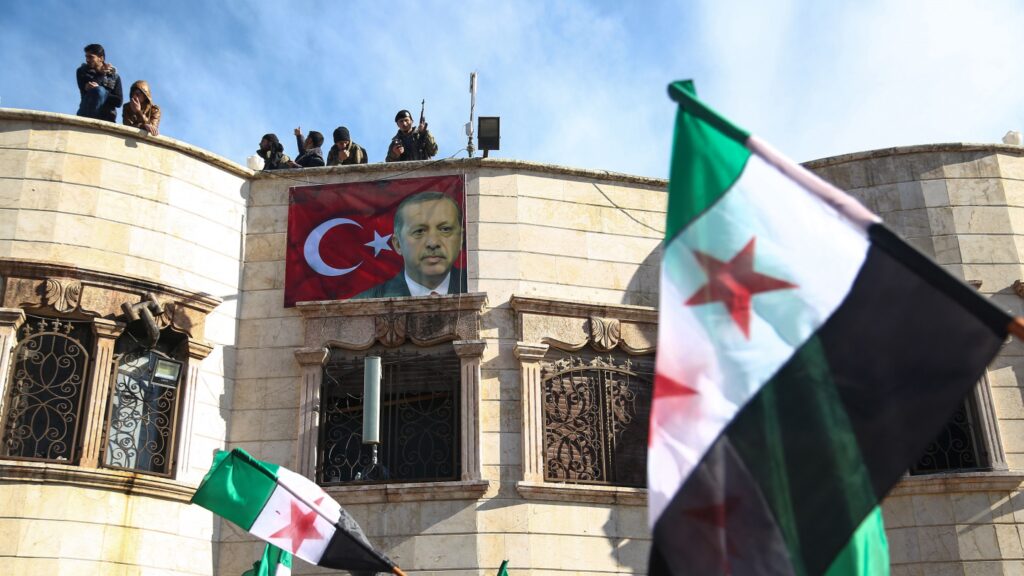
Analysis: The crisis could allow Turkey to advance two long-held goals: the mass return of Syrian refugees and eliminating the Kurdish presence on its border.
Syria’s civil war has returned to the spotlight as groups opposed to President Bashar Al-Assad launched surprise offensives last week, capturing parts of Aleppo, the country’s second-largest city, and gaining ground in the city for the first time since 2015.
Turkey has officially denied any involvement in the offensives, which saw the regime in Damascus lose swathes of territory in northwestern Syria in an attack led by former Al-Qaeda affiliate Hayat Tahrir al-Sham (HTS) and the Turkey-backed militias of the Syrian National Army (SNA), which are in control of much of northern Syria. Since 2011, Syria’s war has killed over 500,000 and sent nearly 6 million refugees fleeing the country.
Analysts say that the crisis provides Turkey with an opportunity to advance two of its long-held goals in the region: facilitating the mass return of Syrian refugees and eliminating the Kurdish presence on its border.
“It would be a mistake at this time to try to explain the events in Syria by any foreign interference,” Turkish Foreign Minister Hakan Fidan said at a joint press conference in Ankara with his Iranian counterpart Abbas Araghchi on Monday, adding that the offensives could be seen as a response to Assad’s failure to engage in dialogue.
“The lack of talks between the regime and the opposition has brought the problem to this point,” he said.
Araghchi, for his part, blamed “terrorist groups in Syria [with] connections to the United States and Israel”, reflecting that the two countries are far from seeing eye to eye.
According to reports, however, Ankara, Moscow, and Tehran have agreed to meet to revive the Astana process next weekend in Qatar. “We will try to activate this process again,” Araghchi said.
Ankara and Damascus severed ties in 2011 at the onset of the Syrian war, with Erdogan supporting the rebels and labelling Assad a “murderer”.
Since late 2022, however, the Turkish president has pursued reconciliation, even stating in July that he was prepared to host Assad “at any time”. But the Syrian president insisted that any meeting would be contingent on the withdrawal of Turkish forces from territory in northwest Syria.
“Russia is occupied in Ukraine and Hezbollah has withdrawn many of its fighters back to Lebanon to fight Israel,” former Turkish ambassador Omer Onhon told The New Arab. “The opposition must have seen this as an opportunity.”
Russia has since pledged support for Assad and has been stepping up airstrikes on rebel positions in the northwest, causing a wave of internal displacement. Turkey is wary that the renewed fighting could cause another wave of refugees to flee towards its borders – at a time when the official number of Syrian refugees in Turkey saw a significant decrease from nearly four million in 2021 to 3.2 million, according to UN figures.
“The last thing Turkey wanted was further destabilisation in Syria,” argues Matthew Bryza, a former White House and senior State Department official currently based in Istanbul.
“Turkey’s goal in this strategically is to get the refugees back into Syria from Turkey, so they need quiet along the border,” he tells The New Arab. “Turkey didn’t want this, but now it’s exploiting it.”
A large portion of the population in Turkey holds a negative view of refugees, perceiving the policy of hosting migrants as a strain on the country’s struggling economy, despite it receiving significant financial support from Brussels since 2016 to manage the Syrian refugee crisis.
The repatriation of Syrian refugees and other migrants was a central issue in Turkey’s 2023 elections. Opposition leader Kemal Kılıçdaroğlu vowed his party would deport all Syrians within two years, while President Erdogan pledged to oversee the “voluntary” return of one million refugees to a Turkish-controlled “safe zone” in northern Syria.
Turkey’s migration management directorate said that between 2016 and September this year, more than 715,000 Syrians had returned.
The gains made by forces opposing Assad offer Ankara a strategic opportunity to target Kurdish groups controlling other parts of northern Syria, particularly the Washington-backed People’s Protection Units (YPG).
Turkey considers the YPG a terrorist organisation due to its ties to the Kurdistan Workers’ Party (PKK), which has waged an insurgency against Turkey since the 1980s. Since 2016, Turkey has gradually reduced the Kurdish presence in the northwest through a series of military operations.
“Turkey is following the YPG closely,” says Onhon. “Their weakening and losing places like Tel Rifaat is important and in favour of Turkish interests.”
On Sunday, Turkey-backed rebels seized Tel Rifaat, a town north of Aleppo about ten kilometres from the Turkish border, and the surrounding villages, where some 200,000 Syrian Kurds were living.
“Pushing Kurdish forces to the east of the Euphrates River has been a Turkish goal for the past decade,” Bryza says.
“And this time, it seems Washington is acquiescing because Washington is not criticising this Turkish move right now.”
